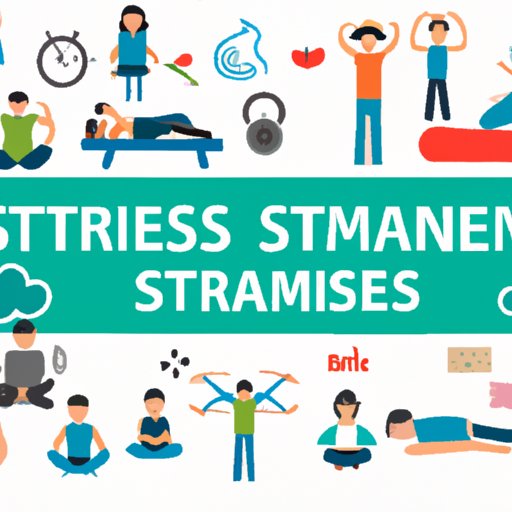
Introduction
Stress is a natural physical and mental reaction that can become a common problem and negatively affect our quality of life. In today’s fast-paced life, managing stress has become more important than ever. Learning effective strategies to prevent and manage stress can help you better cope with life’s inevitable stressors.
Mindfulness
Mindfulness is a practice that teaches you to pay attention to your present moment and become more aware of your thoughts and feelings. This technique is beneficial for reducing stress levels and has become popular in recent decades.
There are several benefits of mindfulness. Research shows that it can lower blood pressure, heart rate, and reduce stress and anxiety levels. Mindfulness helps people to focus on positive thoughts, reinforces better decision-making, and enhances mental clarity.
Techniques for practicing mindfulness include deep breathing, guided meditation, and yoga. Breathing exercises help in slowing down your breathing to reduce your stress response. Guided meditation helps you focus on your breathing and thoughts to reduce anxiety and stress. Yoga combines breathing, meditation, and poses to enhance relaxation and reduce stress.
Tips for incorporating mindfulness into your daily routine include practicing it regularly, starting small, using guided meditation apps, and finding a quiet and relaxed spot to engage in mindfulness activities.
Time Management
Time Management is an essential strategy for reducing stress levels. It is the art of managing time effectively to maximize productivity, and reduce stress levels. Effective time management techniques require planning and prioritizing tasks.
Effective time-management techniques include scheduling tasks into reasonable time slots, setting deadlines, breaking tasks into smaller goals, eliminating distractions, and delegating tasks to others where possible.
To prioritize tasks, one should start by understanding the importance and urgency of each task. A priority list keeps you focused on your most critical tasks and prevents you from wasting your time, thus reducing stress levels.
Regular Exercise
A regular exercise routine can reduce stress levels significantly. Exercise releases endorphins that make us feel happy and reduce stress levels.
Regular exercise routines include cardiovascular, strength training, and yoga. These exercises reduce the levels of cortisol, a hormone responsible for stress. Cardiovascular and strength training exercises also increase metabolic rate, which can lead to faster weight loss.
Tips for staying motivated in your regular exercise routine include setting achievable goals, setting a workout schedule, finding a workout buddy or a support group, and keeping a record of your progress.
Healthy Eating Habits
Eating healthy food is essential to managing stress levels. Consumption of unhealthy food can lead to digestive problems and inflammation, leading to increased stress levels.
Foods that can help in reducing stress include salmon, blueberries, avocado, dark chocolate, and almonds. Salmon is rich in omega-3 fatty acids, which helps in regulating cortisol levels, reducing stress. Blueberries help in reducing inflammation and overactive stress hormones. Avocado is rich in vitamins B and E, which helps in regulating stress hormones. Dark chocolate is rich in magnesium, which helps in muscle relaxation and stress relief. Almonds are rich in vitamin E, which helps in fighting cell damage caused due by stress.
Tips for eating more healthily include creating a meal plan, cooking your meals, avoiding processed foods, and carrying healthy snacks with you.
Adequate Rest and Sleep
Adequate rest and sleep are essential for the proper management of stress. Lack of sleep increases stress levels and leads to fatigue, irritability, and decreased concentration. Adults should aim to get 7-8 hours of sleep every night and maintain a consistent sleep schedule.
Tips for improving sleep habits include creating a sleep-conducive environment, avoiding caffeine and alcohol, using white noise machines, and avoiding the use of screens before sleep.
Social Support
Social support from friends, family, and colleagues can help reduce stress levels. Sometimes sharing our feelings with others can help us cope with the stressors in our lives.
Sources of social support include friends, family, religious or spiritual groups, and support groups. Supportive interactions can be face-to-face or virtual, such as phone calls and social media.
To seek and maintain social support, one should identify people they can talk to, send a message to someone, ask someone to listen and offer help, or join a support group. It’s essential to recognize the people you can rely on during stressful times.
Conclusion
Managing stress requires patience, awareness, and commitment, but it’s definitely possible! Incorporating mindfulness, effective time management techniques, regular exercise, healthy eating habits, adequate rest and sleep, and social support can help in reducing stress levels. Getting rid of stress is essential to leading a happy and healthy life.
Remember, small changes can lead to significant improvements in stress management. Stay positive and be patient with yourself. Seeking help from professionals can help you build sustainable long term techniques for reducing stress and promoting wellbeing.
Further Reading and Resources
1. The Mindful Leader: How to Focus on What Matters for Productivity and Well-Being.
2. The Power of Positive Thinking.
3. Time Management for Dummies.
4. The Mayo Clinic Guide to Stress-Free Living.
5. The American Psychological Association (APA) webpage on stress management.




